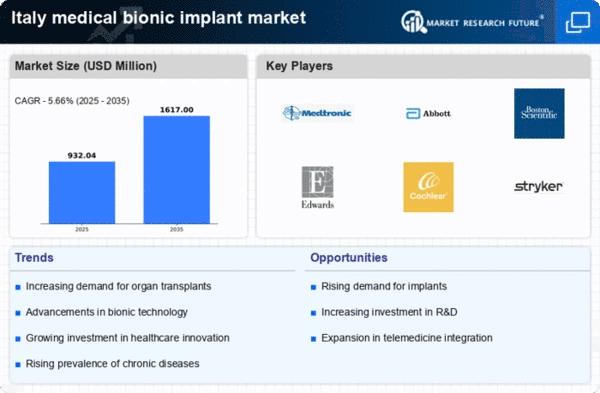Rising Aging Population
The aging population in Italy is a crucial driver for the medical bionic-implant-artificial-organs market. As the demographic shifts towards older age groups, the prevalence of chronic diseases and organ failures increases. This trend necessitates advanced medical solutions, including bionic implants and artificial organs, to enhance the quality of life for elderly patients. According to recent statistics, approximately 23% of the Italian population is over 65 years old, indicating a growing market for innovative healthcare solutions. The demand for effective treatments and organ replacements is likely to surge, propelling the growth of the medical bionic-implant-artificial-organs market. Furthermore, the healthcare system's focus on improving geriatric care may lead to increased investments in research and development, fostering innovation in this sector.
Rising Awareness of Organ Donation
The increasing awareness of organ donation in Italy is contributing to the medical bionic-implant-artificial-organs market. Public campaigns and educational initiatives have led to a greater understanding of the importance of organ donation, which, in turn, has heightened the demand for alternatives such as bionic implants and artificial organs. As the gap between organ supply and demand persists, patients and healthcare providers are exploring innovative solutions to address this challenge. The medical bionic-implant-artificial-organs market stands to benefit from this shift in perception, as more individuals seek out advanced medical technologies to improve their health outcomes. Additionally, the potential for bionic devices to serve as viable alternatives to traditional organ transplants may further drive market growth.
Focus on Chronic Disease Management
The growing focus on chronic disease management in Italy is a significant driver for the medical bionic-implant-artificial-organs market. With an increasing prevalence of conditions such as diabetes, heart disease, and renal failure, there is a pressing need for effective treatment options. Bionic implants and artificial organs offer promising solutions for managing these chronic conditions, providing patients with improved functionality and quality of life. The Italian healthcare system is increasingly prioritizing chronic disease management, leading to enhanced funding and resources for innovative medical technologies. This trend is likely to propel the medical bionic-implant-artificial-organs market, as healthcare providers seek to implement advanced solutions that address the complexities of chronic disease management.
Increased Investment in Healthcare R&D
Investment in healthcare research and development (R&D) is a pivotal driver for the medical bionic-implant-artificial-organs market. In Italy, both public and private sectors are recognizing the importance of funding innovative medical technologies. The Italian government has allocated substantial resources to support R&D initiatives, with a focus on developing advanced medical devices. This financial backing is likely to stimulate breakthroughs in bionic implants and artificial organs, addressing the growing demand for effective healthcare solutions. Furthermore, collaborations between universities and industry players are fostering an environment conducive to innovation. As a result, the medical bionic-implant-artificial-organs market is poised for growth, driven by the continuous influx of new technologies and improved treatment options.
Technological Integration in Healthcare
The integration of advanced technologies in healthcare is significantly influencing the medical bionic-implant-artificial-organs market. Innovations such as artificial intelligence, robotics, and 3D printing are enhancing the design and functionality of bionic devices. In Italy, hospitals and research institutions are increasingly adopting these technologies to improve patient outcomes. For instance, the use of 3D printing in creating customized implants allows for better compatibility with patients' anatomical structures. This technological evolution not only improves the efficacy of treatments but also reduces recovery times, which is particularly appealing in a healthcare landscape that prioritizes efficiency. As a result, the medical bionic-implant-artificial-organs market is expected to expand as healthcare providers seek to incorporate these cutting-edge solutions into their offerings.
















